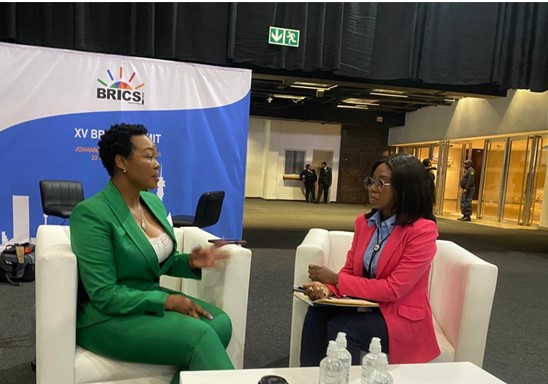
…on positioning entrepreneurs and SSME ecosystem for growth
On a typical day, you would have seen the Inspiring Start-ups page spotlighting an entrepreneur or a small and medium-sized enterprise (SME) that is doing incredibly well in the entrepreneurial ecosystem.
This, however, is not the case this week. Instead, we are bringing you an insightful conversation with South Africa’s Minister of Small Business Development, Stella Ndabeni-Abrahams from Johannesburg on the side-lines of the 2023 Brazil, Russia, India, China and South Africa (BRICS) Summit.
Have a good read as the minister shares her thoughts on positioning SME to achieve growth and to contribute to the economies of African countries and other matters.
Small and medium enterprises (SMEs) are the backbone of the world economy, accounting for most businesses across nearly every region. Available data put forth by the Centre for Strategic and International Studies in 2021 has it that in the developing world, “SMEs make up 90 percent of the private sector and create more than 50 percent of jobs in their corresponding economies.
In Africa, SMEs provide an estimated 80 percent of jobs across the continent, representing an important driver of economic growth.
With such huge potential, Ms. Ndabeni-Abrahams is confident that the continent’s economic status quo can change if it intentionally leverages entrepreneurship or invests and builds the capacity of small, medium and micro enterprises (SMMEs). The best way to do this, she explains, is to assist them to scale up and achieve the skills required to increase production and penetrate other markets.
She is of the view that respective African countries must adopt an ecosystem approach and ensure a conducive environment to build a thriving entrepreneurship space.

B&FT: How crucial are the SMMEs to Africa’s economy?
Answer: Most economies are driven by SMMEs therefore if Africa takes that into consideration, we will be able to change the economic status quo, be it the quest to tackle unemployment or grow the economies. SMMEs play a critical role which is why BRICS and the heads of states in their speeches are emphasising the need to bring SMMEs to their rightful place for a significant change.
B&FT: How can enterprises bounce back better and build resilience after being impacted by major downturns?
Answer: I will say networking opportunity because it is the first access. But for small businesses to get access to opportunities, they must be able to share a story with and have a potential client. Given that all persons could be potential clients, what that means is that governments need to create a conducive environment and look at their legislative provisions to ascertain whether they are sound to enable small businesses to operate and even trade with markets outside the country.
Also, understanding the market intelligence of each country is key. For example, looking at the ecosystem to see how and what they (SSMEs) are doing in the different African countries and be able to join forces for a formidable ally that can leverage the market we have as a continent that must trade with other countries, and for that to happen, a clear regulatory framework must be in place.
B&FT: Given its projected contribution to economies, what can individual countries do to better position SSMEs for growth?
Answer: The first thing is to look at the country’s legislative framework, checking out legal provisions in place that could prohibit the participation of small businesses.
The second issue to look out for is in the aspect of trade, thus gathering market intelligence, concerning what one has as economic growth drivers in their respective countries. Once the economic drivers are identified, the third move is to make sure to let innovation take center stage. For example, in South Africa, aside from what the private sector and other institutions of higher learning have done, we have built many incubators as a government.
This is to make sure that we can take an entrepreneur from an ideation stage to a prototype level. I know certain African countries that are doing well like Kenya, Nigeria and others. This is what Africa needs to appreciate and prioritise.
For instance, if you look at our (South Africa) economic recovery and reconstruction plan, we prioritised the need for SMMEs to be in the center and to localise so we can be able to manufacture certain items to replace those that are imported. We do this not because we do not appreciate the trade relations with our counterparts but to make sure that Africa as a continent can leverage its strength. With 1.4 billion people, that is a market on its own, we need to unite and develop policies that will encourage collaboration among ourselves as we build our economies.
B&FT: How crucial is it for countries to adopt an ecosystem approach in this regard?
Answer: The silos strategy we utilised was one of our vulnerabilities over the years. We present developed policies to the government as if they were created for us (government), and this is why we failed to place SMMEs where they belonged. African countries must adopt an ecosystem approach thus putting the SMMEs squarely at the centre of decision-making.
B&FT: What is South Africa doing differently in its ecosystem that is worth emulating?
Answer: Bringing all businesses on board. South Africa is doing that very well because like I said, we need to co-exist as big and small businesses.
B&FT: The BRICS entrepreneurial opportunity & market access as a key enabler for SMMEs.
The presence of BRICS, she said, is an enabler for the African Continental Free Trade Area (AfCFTA), however, African countries must build a united front to leverage each other’s strength, enhance its manufacturing capacity and invest in logistic arrangements and its entrepreneurs. “Let’s identify our strengths, build on them and leverage them for stronger economies”.
B&FT: Thank you.









